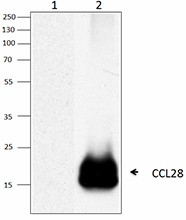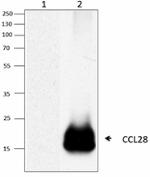- Clone
- Poly5242 (See other available formats)
- Regulatory Status
- RUO
- Other Names
- Mucosa-associated epithelial chemokine (MEC), CCK1, SCYA28, small inducible cytokine A28
- Isotype
- Goat Polyclonal Ig
- Ave. Rating
- Submit a Review
- Product Citations
- publications

-

Western blot analysis of 50 ng of recombinant human CCL28 (lane 1) and 50 ng of recombinant mouse CCL28 (lane 2) using biotinylated anti-mouse CCL28 (clone Poly5242) antibody.
| Cat # | Size | Price | Quantity Check Availability | Save | ||
|---|---|---|---|---|---|---|
| 524203 | 50 µg | 375 CHF | ||||
Mouse CCL28 was identified in an EST database using a human chemokine consensus sequence. CCL28 is constitutively expressed by mucosal epithelial cells such as exocrine glands, trachea, and colon. Acinar epithelial cells in human and mouse salivary glands are strongly positive for CCL28 by immunostaining, and human saliva and milk contain high concentrations of CCL28. Furthermore, it is known that human and mouse CCL28 have antimicrobial activity attributed to the C-terminus of CCL28 against Candida albicans, Gram-negative bacteria, and Gram-positive bacteria. In addition, using a CCR10 deficient mouse model, it was shown that CCR10 plays a critical role in localization and accumulation of IgA ASC in lactating mammary glands. Also, it has been described that CCL28 is upregulated in epithelial inflammation and this upregulation allows the recruitment of Tregs expressing CCR10. In fact, a subpopulation of CCR10-expressing CD25+ CD4+ Foxp3+ Tregs with potent anti-inflammatory properties was isolated from a chronically inflamed human liver. Information suggests that tumor hypoxia promotes the recruitment of Treg cells through induction of expression of CCL28, and this induction is mediated by the hypoxia inducible factor-1α (HIF-1α). Therefore, tumor hypoxia promotes tolerance and angiogenesis via CCL28 and Treg cells.
Product DetailsProduct Details
- Verified Reactivity
- Mouse
- Antibody Type
- Polyclonal
- Host Species
- Goat
- Immunogen
- Recombinant mouse CCL28
- Formulation
- Phosphate-buffered solution, pH 7.2, containing 0.09% sodium azide.
- Preparation
- The antibody was purified by affinity chromatography and conjugated with biotin under optimal conditions.
- Concentration
- 0.5 mg/ml
- Storage & Handling
- The antibody solution should be stored undiluted between 2°C and 8°C. Do not freeze.
- Application
-
ELISA Detection - Quality tested
- Recommended Usage
-
Each lot of this antibody is quality control tested by ELISA assay. For ELISA detection applications, a concentration range of 0.1-0.2 µg/mL is recommended. To obtain a linear standard curve, serial dilutions of mouse CCL28 recombinant protein ranging from 1000 to 15.6 pg/mL are recommended for each ELISA plate. It is recommended that the reagent be titrated for optimal performance for each application.
- Application Notes
-
ELISA Detection: The biotinylated Poly5242 antibody is useful as the detection antibody in a sandwich ELISA assay, when used in conjunction with the purified L019H7 antibody (Cat. No. 525802) as the capture antibody.
- RRID
-
AB_2563255 (BioLegend Cat. No. 524203)
Antigen Details
- Structure
- Chemokine
- Distribution
-
Mucosal epithelial cells
- Function
- CCL28 chemoattracts resting CD4, CD8, and IgA antibody secreting cells. It plays a role in extravasation of IgA ASC in the small intestine, colon, lactating mammary glands, and has antimicrobial activity. CCL28 is upregulated by IL-1 or n-butirate in human colon epithelial cell lines, and IL-1 and n-butirate have a synergistic effect on CCL28 upregulation. Hypoxia induces CCL28 in tumors.
- Interaction
- CD4 and CD8 T cells, IgA antibody secreting cells, CCR10-expressing CD25+ CD4+ Foxp3+ Tregs
- Ligand/Receptor
- CCR10, CCR3
- Cell Type
- Epithelial cells, Tregs
- Biology Area
- Angiogenesis, Cell Biology, Immunology, Innate Immunity
- Molecular Family
- Cytokines/Chemokines
- Antigen References
-
1. Wang W, et al. 2000. J. Biol. Chem. 275:22313.
2. Hieshima K, et al. 2003. J. Immunol. 170:1452.
3. Hieshima K, et al. 2004. J. Immunol. 173:3668.
4. Ogawa H, et al. 2004. Am. J. Physiol. Gastrointest. Liver Physiol. 287:G1062.
5. Eksteen B, et al. 2006. J. Immunol. 177:593.
6. Morteau O, et al. 2008. J. Immunol. 181:6309
7. Liu B and Wilson E. 2010. Eur. J. Immunol. 40:186.
8. Facciabene A, et al. 2011. Nature 475:226. - Gene ID
- 56838 View all products for this Gene ID
- UniProt
- View information about CCL28 on UniProt.org
Related FAQs
- How many biotin molecules are per antibody structure?
- We don't routinely measure the number of biotins with our antibody products but the number of biotin molecules range from 3-6 molecules per antibody.
Other Formats
View All CCL28 Reagents Request Custom Conjugation| Description | Clone | Applications |
|---|---|---|
| Biotin anti-mouse CCL28 (MEC) | Poly5242 | ELISA Detection |
Compare Data Across All Formats
This data display is provided for general comparisons between formats.
Your actual data may vary due to variations in samples, target cells, instruments and their settings, staining conditions, and other factors.
If you need assistance with selecting the best format contact our expert technical support team.
-
Biotin anti-mouse CCL28 (MEC)

Western blot analysis of 50 ng of recombinant human CCL28 (l...
 Login / Register
Login / Register 











Follow Us